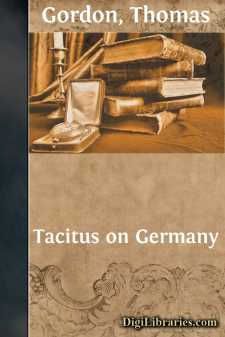Categories
- Antiques & Collectibles 13
- Architecture 36
- Art 48
- Bibles 22
- Biography & Autobiography 813
- Body, Mind & Spirit 142
- Business & Economics 28
- Children's Books 15
- Children's Fiction 12
- Computers 4
- Cooking 94
- Crafts & Hobbies 4
- Drama 346
- Education 46
- Family & Relationships 57
- Fiction 11828
- Games 19
- Gardening 17
- Health & Fitness 34
- History 1377
- House & Home 1
- Humor 147
- Juvenile Fiction 1873
- Juvenile Nonfiction 202
- Language Arts & Disciplines 88
- Law 16
- Literary Collections 686
- Literary Criticism 179
- Mathematics 13
- Medical 41
- Music 40
- Nature 179
- Non-Classifiable 1768
- Performing Arts 7
- Periodicals 1453
- Philosophy 64
- Photography 2
- Poetry 896
- Political Science 203
- Psychology 42
- Reference 154
- Religion 513
- Science 126
- Self-Help 84
- Social Science 81
- Sports & Recreation 34
- Study Aids 3
- Technology & Engineering 59
- Transportation 23
- Travel 463
- True Crime 29
Tacitus on Germany
by: Thomas Gordon
Categories:
Description:
Excerpt
INTRODUCTORY NOTE
The dates of the birth and death of Tacitus are uncertain, but it is probable that he was born about 54 A. D. and died after 117. He was a contemporary and friend of the younger Pliny, who addressed to him some of his most famous epistles. Tacitus was apparently of the equestrian class, was an advocate by training, and had a reputation as an orator, though none of his speeches has survived. He held a number of important public offices, and married the daughter of Agricola, the conqueror of Britain, whose life he wrote.
The two chief works of Tacitus, the "Annals" and the "Histories," covered the history of Rome from the death of Augustus to A. D. 96; but the greater part of the "Histories" is lost, and the fragment that remains deals only with the year 69 and part of 70. In the "Annals" there are several gaps, but what survives describes a large part of the reigns of Tiberius, Claudius, and Nero. His minor works, besides the life of Agricola, already mentioned, are a "Dialogue on Orators" and the account of Germany, its situation, its inhabitants, their character and customs, which is here printed.
Tacitus stands in the front rank of the historians of antiquity for the accuracy of his learning, the fairness of his judgments, the richness, concentration, and precision of his style. His great successor, Gibbon, called him a "philosophical historian, whose writings will instruct the last generations of mankind"; and Montaigne knew no author "who, in a work of history, has taken so broad a view of human events or given a more just analysis of particular characters."
The "Germany" is a document of the greatest interest and importance, since it gives us by far the most detailed account of the state of culture among the tribes that are the ancestors of the modern Teutonic nations, at the time when they first came into account with the civilization of the Mediterranean.
The whole of Germany is thus bounded; separated from Gaul, from Rhoetia and Pannonia, by the rivers Rhine and Danube; from Sarmatia and Dacia by mutual fear, or by high mountains: the rest is encompassed by the ocean, which forms huge bays, and comprehends a tract of islands immense in extent: for we have lately known certain nations and kingdoms there, such as the war discovered. The Rhine rising in the Rhoetian Alps from a summit altogether rocky and perpendicular, after a small winding towards the west, is lost in the Northern Ocean. The Danube issues out of the mountain Abnoba, one very high but very easy of ascent, and traversing several nations, falls by six streams into the Euxine Sea; for its seventh channel is absorbed in the Fenns.
The Germans, I am apt to believe, derive their original from no other people; and are nowise mixed with different nations arriving amongst them: since anciently those who went in search of new dwellings, travelled not by land, but were carried in fleets; and into that mighty ocean so boundless, and, as I may call it, so repugnant and forbidding, ships from our world rarely enter....


